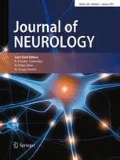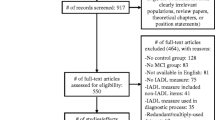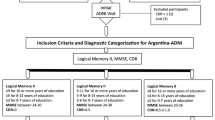Abstract
The multimodal assessment of capacities in severe dementia (MAC-SD), a novel cognitive and functional assessment, was developed for use with patients with severe dementia. Its psychometric attributes were examined in a unicenter, open, observational study. The MAC-SD along with the Spanish language Severe Mini Mental Exam were administered to 103 patients with a diagnosis of severe dementia. Psychometric analyses were performed to determine acceptability, reliability, validity, and responsiveness. As a whole, the MAC-SD sections showed no floor effects, satisfactory internal consistency, reproducibility, construct validity, precision, and sensitivity to change. The MAC-SD performed as a useful, valid, and potentially responsive tool to measure cognition and functioning in the most advanced stages of dementia.
Similar content being viewed by others
References
Reisberg B (2007) Global measures: utility in defining and measuring treatment response in dementia. Int Psychogeriatr 19:421–456
Bonnel WB (1996) Not gone and not forgotten: a spouse’s experience of late-stage Alzheimer’s disease. J Psychosoc Nurs Ment Health Serv 34:23–27
Schmitt FA (1997) SIB: current validity and assessment of longitudinal change in AD. Alzheimer Dis Assoc Dis 11:S51–S56
Voisin T, Reynish E, Portet F, Feldman H, Vellas B (2004) What are the treatment options for patients with severe AD? CNS Drugs 18:575–583
Robert P, Ferris S, Gauthier S, Ihl R, Winblad B, Tennigkeit F (2010) Review of AD Scales: is there a need for a new multi-domain scale for therapy evaluation in medical practice? Alzheimers Res Ther 22:24
Schmitt FA, Cragar D, Ashford JW, Reisberg B, Ferris S, Möbius HJ, Stöffler A (2002) Measuring cognition in advanced AD for clinical trials. J Neural Transm Suppl 62:135–148
Holthoff VA, Ferris S, Ihl R, Robert P, Winblad B, Gauthier S, Sternberg K, Tennigkeit F (2011) Validation of the relevant outcomes scale for Alzheimer’s disease: a novel multidomain assessment for daily medical practice. Alzheimers Res Ther 3:27
Olazarán J, Agüera-Ortiz L, Osorio RS, León-Salas B, Dobato JL, Cruz-Orduña I, González B, Valentí M, Gil-Ruiz N, Frades B, Ramos García MI, Martínez-Martín P (2012) Promoting clinical research in advanced dementia: early clinical results of the Alzheimer Center Reina Sofia Foundation. J Alzheimers Dis 28:211–222
Martínez-Martín P, Avila J, AD Research Unit Investigators (2010) Alzheimer Center Reina Sofia Foundation: fighting the disease and providing overall solutions. J Alzheimers Dis 21:337–348
Auer S, Reisberg B (1997) The GDS/FAST staging system. Int Psychogeriatr 9:167–171
Buiza C, Navarro A, Díaz-Orueta U, González MF, Alaba J, Arriola E, Hernández C, Zulaica A, Yanguas JJ (2011) Short evaluation of cognitive state in advanced stages of dementia: preliminary results of the Spanish validation of the Severe-Mini Mental State Examination. Rev Esp Geriatr Geruntol 46:131–138
Mokkik L, Terwee C, Knol D, Stratford P, Alonso J, Patrick D, Bouter L, de Vet H (2010) The COSMIN checklist for evaluating the methodological quality of studies on measurement of properties: a clarification of its content. BMC Med Res Methodol 10:22
Martinez-Martin P, Frades-Payo B, Agüera-Ortiz L, Ayuga-Martinez A (2012) A short scale for evaluation of neuropsychiatric disorders in Parkinson’s disease: first psychometric approach. J Neuro 259:2299–2308
Martinez Martin P, Forjaz MJ (2012) How to evaluate validation data. In: Sampaio C, Goetz CG, Schrag A (eds) Rating scales in Parkinson’s disease. Oxford University Press, Oxford, pp 16–41
Ware JE, Gandek B (1998) Methods for testing data quality, scaling assumptions, and reliability: the IQOLA Project approach. International quality of life assessment. J Clin Epidemiol 51:945–952
Martinez-Martin P, Rodriguez-Blazquez C, Alvarez-Sanchez M, Arakaki T, Bergareche-Yarza A, Chade A, Garretto N, Gershanik O, Kurtis MM, Martínez-Castrillo JC, Mendoza-Rodriguez A, Moore HP, Rodriguez-Violante M, Singer C, Tilley BC, Huang J, Stebbins GT, Goetz CG (2013) Expanded and independent validation of the Movement Disorder Society—Unified Parkinson’s Disease Rating Scale (MDS-UPDRS). J Neurol 260:228–236
Juniper EF, Guyatt GH, Jaeschke R (1996) How to develop and validate a new health-related quality of life instrument. In: Spilker B (ed) Quality of life and pharmacoeconomics in clinical trials, 2nd edn. Lippincott-Raven Publishers, Philadelphia, pp 49–56
Martinez-Martin P, Rodriguez-Blazquez C, Abe K, Bhattacharyya KB, Bloem BR, Carod-Artal FJ, Prakesh R, Esselink RA, Falup-Pecurariu C, Gallardo M, Mir P, Naidu Y, Nicoletti A, Sethi K, Tsuboi Y, van Hilten JJ, Visser M, Zappia M, Chaudhuri KR (2009) International study on the psychometric attributes of the Non-Motor Symptoms Scale in Parkinson disease. Neurology 73:1584–1591
Middel B, van Sonderen E (2002) Statistical significant change vs. relevant or important change in (quasi) experimental design: some conceptual and methodological problems in estimating the magnitude of intervention-related change in health services research. Int J Integr Care 2:e15
Cohen J (1977) Statistical power analysis for the behavioral sciences, Rev edn. Academic Press, New York
Deyo RA, Centor RM (1986) Assessing the responsiveness of functional scales to clinical change: an analogy to diagnostic test performance. J Chronic Dis 39:897–906
Terwee CB, Bot SD, de Boer MR, van der Windt DA, Knol DL, Dekker J, Bouter LM, de Vet HC (2007) Quality criteria were proposed for measurement properties of health status questionnaires. J Clin Epidemiol 60:34–42
McKhann G, Drachmann D, Folstein M, Katzman R, Price D, Stadlan EM (1984, 2013) Clinical diagnosis of Alzheimer’s disease: Report of the NINCDS-ADRA Work Group under the auspices of Department of Health and Human Services Task Force on Alzheimer’s disease. Neurology 34:939–44
Benke T, Andree B, Hittmair M, Gerstenbrand F (1990) Speech changes in dementia. Fortschr Neurol Psychiatr 58:215–223
Vink AC, Bruinsma MS, Scholten RJPM (2007) Music therapy for people with dementia (Review). Cochrane Reviews. http://www.bibliotecacochrane.com/pdf/CD003477.pdf. Accessed 15 Sept 2013
Hall L, Orrell M, Stott J, Spector A (2012) Cognitive stimulation therapy (CST): neuropsychological mechanisms of change. Int Psychogeriatr 25:479–489
Reisberg B, Ferris SH, de Leon MJ, Crook T (1988) Global Deterioration Scale (GDS). Psychopharmacol Bull 24:661–663
Schmidt R, Kienbacher E, Benke T, Dal-Bianco P, Delazer M, Ladurner G, Jellinger K, Ransmayer G, Schmidt H, Stögmann E, Friedrich J, Wehringer C (2008) Sex differences in Alzheimer’s disease. Neuropsychiatry 22:1–15
Xing Y, Wei C, Chu C, Zhou A, Li P, Wu L, Song H, Zuo X, Wang F, Qin W, Li D, Tang Y, Jia XF, Jia J (2012) Stage-specific gender differences in cognitive and neuropsychiatric manifestations of vascular dementia. Am J Alzheimers Dis Other Demen 27:433–438
Bernick C, Cummings J, Raman R, Sun X, Aisen P (2012) Age and rate of cognitive decline in Alzheimer disease: implications for clinical trials. Arch Neurol 69:901–905
Beckerman H, Roebroeck ME, Lankhorst GJ, Becher JG, Bezemer PD, Verbeek AL (2001) Smallest real difference, a link between reproducibility and responsiveness. Qual Life Res 10:571–578
Maheswaran H, Weich S, Powell J, Stewart-Brown S (2012) Evaluating the responsiveness of the Warwick Edinburgh Mental Well-Being Scale (WEMWBS): group and individual level analysis. Health Qual Life Outcomes 10:156
Rapp MA, Schnaider-Beeri M, Schmeidler J, Sano M, Silverman JM, Haroutunian V (2005) Relationship of neuropsychological performance to functional status in nursing home residents and community-dwelling older adults. Am J Geriatr Psychiatry 13:450–459
Sikkes SAM, de Lange-de Klerk ESM, Pijnenburg YAL, Scheltens P, Uitdehaag BMJ (2009) A systematic review of instrumental activities of daily living scales in dementia: room for improvement. J Neurol Neurosurg Psychiatr 80:7–12
Ford GR, Haley WE, Thrower SL, West CA, Harrell LE (1996) Utility of Mini-Mental State Exam scores in predicting functional impairment among White and African American dementia patients. J Gerontol A Biol Sci Med Sci 51:M185–M188
Lehfield H, Erzigkeit H (2000) Loss of activities of daily living function (ADL) and cognitive impairment in various stages of dementia. A comparison of ADL informant ratings, ADL self ratings and psychometric test results. Fortschr Neurol Psychiatr 68:262–269
Juva K, Makela M, Erkinjuntti T, Sulkava R, Yukosi R, Valvanne J, Tilvis R (1997) Functional assessment scales in detecting dementia. Age Ageing 26:393–400
Galik E (2010) Function-focused care for LTC residents with moderate-to-severe dementia: a social ecological approach. Ann Longterm Care 18:27–32
Acknowledgments
This work was supported by funding from the William J. Fulbright US Student Program, International Institute of Education and the Comisión Fulbright in Madrid, Spain. The authors would like to thank Laura Fernandez Perez and the staff of the Centro Alzheimer Reina Sofia for their collaboration in bringing this project to fruition, and Harris Eppsteiner for assistance with data analysis.
Conflicts of interest
On behalf of all the authors, the corresponding author states that there is no conflict of interest.
Ethical standard
The study was approved by the Institutional Review Board of the Alzheimer’s Disease Research Unit, CIEN Foundation, and the Ethics Committee of the Carlos III Institute of Health. Informed written consent was obtained from the next of kin or legal representative of each participant.
Author information
Authors and Affiliations
Corresponding author
Electronic supplementary material
Below is the link to the electronic supplementary material.
Rights and permissions
About this article
Cite this article
Heller, S., Rebolledo, C.M., Blázquez, C.R. et al. Validation of the multimodal assessment of capacities in severe dementia: a novel cognitive and functional scale for use in severe dementia. J Neurol 262, 1198–1208 (2015). https://doi.org/10.1007/s00415-015-7692-9
Received:
Revised:
Accepted:
Published:
Issue Date:
DOI: https://doi.org/10.1007/s00415-015-7692-9




